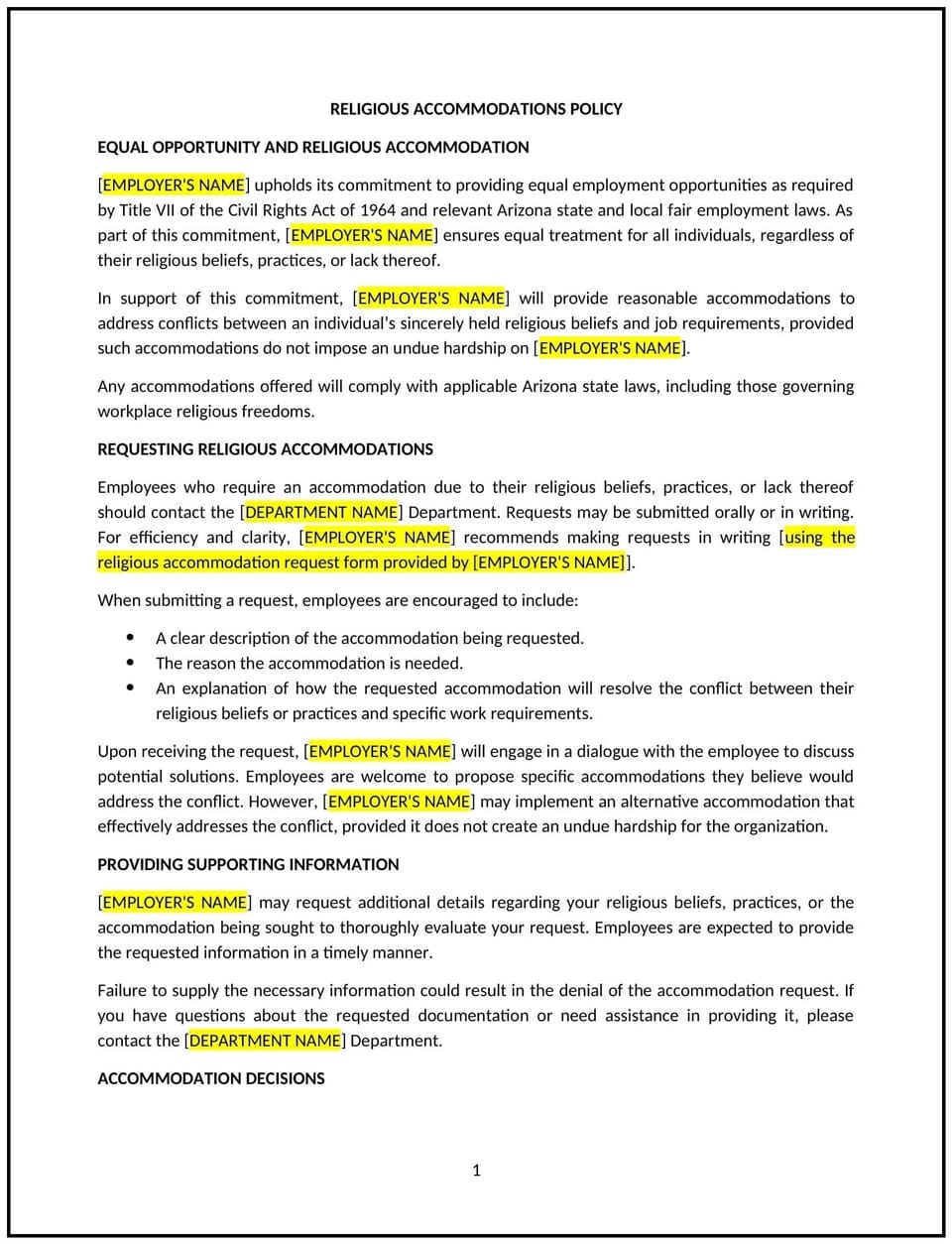Religious accommodations policy (Arizona): Free template

Time off for public duties policy (Kentucky)
A time off for public duties policy provides Kentucky businesses with guidelines for granting employees leave to participate in certain public responsibilities, such as jury service, voting, or serving in elected or appointed positions. This policy ensures employees can fulfill their civic obligations while maintaining workplace productivity.
By adopting this policy, businesses can support civic engagement, comply with legal requirements, and foster goodwill among employees.
How to use this time off for public duties policy (Kentucky)
- Define public duties: Specify the types of public duties covered, such as jury service, voting, attending court as a witness, or serving in an elected or appointed public office.
- Address eligibility: Outline which employees are eligible for time off, including any criteria such as employment status or notice requirements.
- Clarify paid vs. unpaid leave: Indicate whether time off for specific public duties will be paid or unpaid, and provide guidance on using paid leave balances if applicable.
- Include notice requirements: Specify how employees should inform the business about their need for time off, including advance notice and any required documentation.
- Outline job protections: Emphasize that employees will not face adverse consequences for taking time off to fulfill public duties, as required by law.
- Address conflicts: Provide a process for resolving scheduling conflicts if public duties significantly impact business operations.
- Encourage civic engagement: Highlight the business’s support for employees participating in civic responsibilities.
Benefits of using this time off for public duties policy (Kentucky)
This policy provides several key benefits for Kentucky businesses:
- Supports compliance: Helps businesses align with Kentucky laws and federal regulations regarding leave for civic obligations.
- Promotes civic engagement: Encourages employees to participate in public duties, fostering a sense of community and responsibility.
- Protects employee rights: Reinforces the business’s commitment to protecting employees who fulfill their legal and civic responsibilities.
- Maintains workplace fairness: Provides a standardized approach to managing time off for public duties, ensuring consistency across the organization.
- Reduces disputes: Establishes clear expectations and procedures for both employees and managers, minimizing misunderstandings.
Tips for using this time off for public duties policy (Kentucky)
- Communicate the policy: Share the policy during onboarding and include it in employee handbooks to ensure employees understand their rights and responsibilities.
- Train managers: Provide training for managers to handle requests for public duty leave fairly and consistently.
- Require proper documentation: Ensure employees provide supporting documents, such as jury summonses or official letters, for leave requests.
- Plan for coverage: Develop strategies to manage workloads during employee absences to minimize disruptions.
- Review regularly: Update the policy to reflect changes in Kentucky laws, business needs, or best practices.
Q: What types of public duties are covered under this policy?
A: Covered duties may include jury service, voting, serving as a witness in court, or holding an elected or appointed public office.
Q: Is time off for public duties paid or unpaid?
A: The policy specifies whether leave for each type of public duty is paid or unpaid and outlines options for using paid leave if applicable.
Q: How much notice is required to request time off for public duties?
A: Employees should provide advance notice and any required documentation, such as a jury summons, to their manager or HR.
Q: Are employees guaranteed job protection during public duty leave?
A: Yes, employees are protected from retaliation or adverse actions for taking leave to fulfill public responsibilities, as required by law.
Q: Can the business deny a request for time off for public duties?
A: Requests may be denied only if they do not meet eligibility criteria or required documentation is not provided, but businesses must comply with legal obligations.
Q: How are scheduling conflicts managed?
A: Scheduling conflicts are addressed through open communication and adjustments to ensure minimal disruption to business operations.
Q: How often should the time off for public duties policy be reviewed?
A: The policy should be reviewed periodically to ensure it remains aligned with Kentucky laws and workplace needs.
Q: Are employees required to use paid leave balances for public duties?
A: The policy may allow or require the use of paid leave balances, depending on the nature of the public duty and the business’s specific guidelines.
This article contains general legal information and does not contain legal advice. Cobrief is not a law firm or a substitute for an attorney or law firm. The law is complex and changes often. For legal advice, please ask a lawyer.


